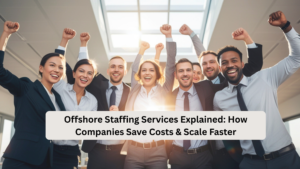
In-House Hiring vs. Recruitment Process Outsourcing: Which Saves More in 2025?
In 2025, in-house hiring vs. recruitment process outsourcing remains a critical decision for businesses in the USA aiming to optimize costs while securing top talent. Rising operational expenses and competitive job markets are pushing companies to evaluate the most cost-effective hiring strategies. This blog explores the key differences, benefits, and cost implications of in-house hiring versus recruitment process outsourcing (RPO), helping businesses make informed decisions to drive efficiency and growth.
Why Compare In-House Hiring vs. Recruitment Process Outsourcing?
In 2025, the in-house hiring vs. recruitment process outsourcing debate is more relevant than ever as USA businesses face talent shortages and increasing recruitment costs. Choosing the right approach can save time, reduce expenses, and ensure access to skilled professionals. This section dives into the core differences and why Optimar Consulting is a trusted partner for companies seeking tailored hiring solutions.
The Cost of In-House Recruitment
The cost of in-house recruitment often surprises businesses due to hidden expenses. Managing recruitment internally requires dedicated HR teams, technology investments, and time-consuming processes. Key costs include:
- Salaries and Training: Full-time HR staff and ongoing training for recruitment tools.
- Technology and Tools: Applicant tracking systems (ATS), job board subscriptions, and background check services.
- Time Delays: Prolonged hiring cycles increase costs and risk losing top candidates.
For industries like AEC & Preconstruction or Information Technology, where specialized skills are critical, in-house hiring challenges such as sourcing niche talent can further inflate costs.
Benefits of Recruitment Process Outsourcing
Recruitment process outsourcing (RPO) involves partnering with an external provider like Optimar Consulting to manage part or all of the hiring process. RPO offers significant advantages, especially for USA-based companies in 2025:
- Cost Savings with RPO: RPO providers streamline processes, reducing recruitment time and expenses by up to 40%, according to industry studies.
- Access to Expertise: RPO firms have specialized recruiters familiar with industries like Manufacturing & Supply Chain and Renewable Energy.
- Scalability: RPO adapts to hiring needs, whether for seasonal surges or long-term growth.
For example, a USA-based renewable energy firm partnered with Optimar Consulting to hire skilled engineers, reducing recruitment costs by 30% through RPO vs. in-house recruitment.
In-House Hiring Challenges vs. Outsourced Model
The internal recruitment vs. outsourced model comparison highlights several pain points of in-house hiring. Internal teams often struggle with:
- Limited resources to source candidates for specialized roles in Accounting & Finance or Mortgage & Title Search.
- High turnover in HR staff, leading to inconsistent hiring processes.
- Inability to scale quickly during rapid business growth.
In contrast, outsourcing recruitment for cost reduction allows businesses to leverage advanced tools and global talent pools. Optimar Consulting, for instance, uses data-driven strategies to deliver top talent across industries, ensuring faster hires and better ROI.
Hiring Cost Comparison: RPO vs. Internal in 2025
A detailed hiring cost comparison RPO vs. internal reveals significant savings with RPO. According to 2025 industry data, in-house recruitment in the USA averages $4,000–$20,000 per hire, depending on the role’s complexity. RPO, however, can reduce costs to $2,000–$10,000 per hire by optimizing processes and minimizing overhead.
Is RPO Cheaper Than In-House Hiring?
The question “Is RPO cheaper than in-house hiring?” depends on business needs. For small to mid-sized firms in the USA, RPO often proves more cost-effective due to:
- Lower fixed costs: No need for in-house HR infrastructure.
- Faster time-to-hire: RPO providers use established networks to fill roles quickly.
- Reduced risk: Expert vetting minimizes bad hires, which can cost businesses up to 30% of an employee’s annual salary.
For example, a Mortgage & Title Search company in the USA switched to RPO with Optimar Consulting in 2025, cutting hiring costs by 25% while improving candidate quality.
When to Choose In-House Hiring
While RPO offers clear benefits, in-house hiring may suit businesses with:
- Small, consistent hiring needs.
- Strong existing HR teams with industry-specific expertise.
- A desire for full control over the hiring process.
However, for industries like Information Technology or AEC & Preconstruction, where talent competition is fierce, the recruitment process outsourcing vs. in-house model often tilts in favor of RPO for its efficiency and expertise.
How Optimar Consulting Drives Recruitment Success
Optimar Consulting specializes in delivering tailored RPO solutions for USA businesses in 2025. By partnering with us, companies in Manufacturing & Supply Chain, Renewable Energy, and other sectors benefit from:
- Customized Recruitment: Strategies aligned with your industry and business goals.
- Global Talent Access: Sourcing candidates from India to the USA and UK.
- Cost Efficiency: Significant cost savings with RPO through streamlined processes.
For example, a USA-based Accounting & Finance firm reduced hiring time by 35% after partnering with Optimar Consulting for RPO services, allowing them to focus on core operations.
Conclusion
In 2025, the in-house hiring vs. recruitment process outsourcing decision hinges on cost, scalability, and expertise. While in-house hiring offers control, it often comes with high costs and inefficiencies. Recruitment process outsourcing, on the other hand, delivers cost savings with RPO, access to specialized talent, and scalability for industries like AEC & Preconstruction, Information Technology, and Renewable Energy. By partnering with Optimar Consulting, USA businesses can optimize their hiring processes and achieve long-term success. Ready to streamline your recruitment?
Contact Optimar Consulting today to explore how RPO can transform your hiring strategy.
Frequently Asked Questions
Q1: What is the main difference between in-house hiring and RPO?
Ans. In-house hiring is managed internally by a company’s HR team, while RPO involves outsourcing recruitment to an external provider like Optimar Consulting for efficiency and cost savings.
Q2: How does RPO save costs compared to in-house hiring?
Ans. RPO reduces costs by streamlining processes, leveraging existing tools, and minimizing bad hires, often saving USA businesses up to 40% on recruitment expenses.
Q3: Is RPO suitable for small businesses in the USA?
Ans. Yes, RPO is scalable and cost-effective, making it ideal for small businesses in industries like Mortgage & Title Search or Accounting & Finance.
Q4: Can RPO help with specialized roles in 2025?
Ans. Absolutely, RPO providers like Optimar Consulting specialize in sourcing talent for niche roles in Information Technology and Renewable Energy.
Q5: How do I know if RPO is right for my company?
Ans. If your business faces high hiring costs, talent shortages, or scalability issues, RPO can offer significant cost savings with RPO and expert support.


